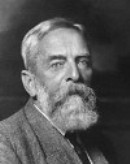Friedrich von Wieser
| Friedrich von Wieser | |
|---|---|
 |
|
| Born |
10 July 1851 Vienna, Austria |
| Died | 22 July 1926 (aged 75) Vienna, Austria |
| Nationality | Austrian |
| School or tradition |
Austrian School |
| Alma mater |
University of Vienna (Dr. jur. 1872) |
| Influences |
Carl Menger Eugen von Böhm-Bawerk |
| Influenced |
Ludwig von Mises Friedrich von Hayek Joseph Schumpeter |
Friedrich Freiherr von Wieser (German: [ˈviːzɐ]; 10 July 1851 – 22 July 1926) was an early (so-called "first generation") economist of the Austrian School of economics. Born in Vienna, the son of Privy Councillor Leopold von Wieser, a high official in the war ministry, he first trained in sociology and law. In 1872, the year he took his degree, he encountered Austrian-school founder Carl Menger's Grundsätze and switched his interest to economic theory. Wieser held posts at the universities of Vienna and Prague until succeeding Menger in Vienna in 1903, where, with brother-in-law Eugen von Böhm-Bawerk, he shaped the next generation of Austrian economists including Ludwig von Mises, Friedrich Hayek and Joseph Schumpeter in the late 1890s and early 20th century. He became Austrian finance minister in 1917.
Wieser is renowned for two main works, Natural Value, which carefully details the alternative-cost doctrine and the theory of imputation, and his Social Economics (1914), an ambitious attempt to apply it to the real world. His explanation of marginal utility theory was decisive, at least terminologically: It was his term Grenznutzen (building on von Thünen's Grenzkosten) that developed into the standard term, "marginal utility," not William Stanley Jevons's "final degree of utility" or Menger's "value." His use of the modifier "natural" indicates that he regarded value as a "natural category" that would pertain to any society, no matter what institutions of property had been established.
...
Wikipedia
